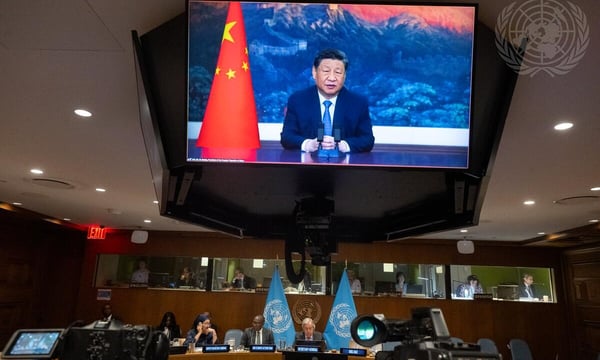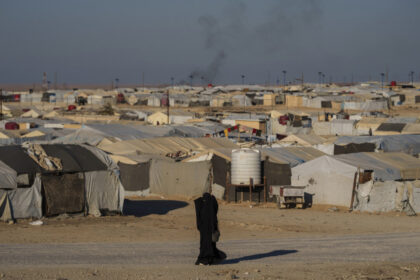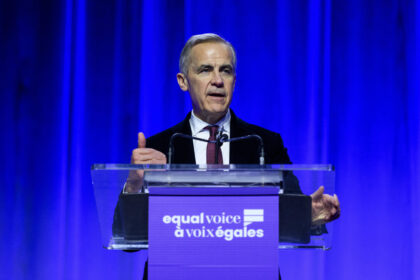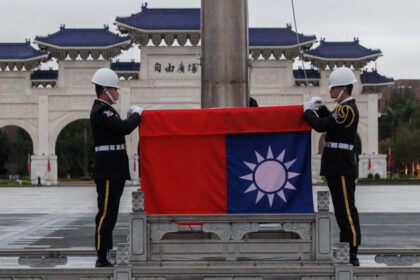On September 23, the United Nations General Assembly convened for the annual General Debate in New York. The city was crowded with foreign dignitaries, especially this year – 2025 marks the 80th anniversary of the founding of the U.N.
But one figure was conspicuously absent: China’s President Xi Jinping. Instead, Xi stayed in China, where he “extended festive greetings” for the farmers’ harvest celebration and visited Urumqi to mark the 70th anniversary of the founding of the Xinjiang Uyghur Autonomous Region.
Those events were duly splashed across the front-page headlines of People’s Daily, the official newspaper of the Chinese Communist Party. Premier Li Qiang’s presence at UNGA received just a one-line mention on the front page for September 24. Xi’s pre-taped video address to the U.N. climate summit got a bit more real estate in the September 25 edition – a picture and one-fourth of one column of text – below three separate stories on Xi in Xinjiang.
Not every national leader attends every UNGA, of course, but Xi’s absence was notable. It was the first time since 1985 that a paramount Chinese leader has failed to personally attend and address the United Nations on the body’s decennial anniversaries. Jiang Zemin was there in 1995; Hu Jintao in 2005; and Xi Jinping in 2015.
Not this year.
The lack of top-level representation matters – both symbolically and practically. For one thing, Xi’s activities dominate Chinese media coverage; as noted above his absence meant Chinese outlets paid little attention to UNGA. In addition, speaking order at UNGA is in part determined by the rank of a country’s representative. Because Xi didn’t attend, Li – as the prime minister, not the president – was relegated to speaking on day four. By contrast, in 2015, when Xi attended, he spoke on the morning of the first day.
Xi did handle the task of addressing this year’s U.N. Climate Summit and announcing China’s new climate commitments, albeit from afar. Despite Li being in New York, Xi gave a brief 5-minute taped address on China’s behalf.
Prior to that, Xi’s last appearance during the General Assembly was via a video message in 2021. He hasn’t attended the United Nation’s big annual gathering in person since 2015.
Less than a month before the 80th UNGA convened, Xi had proposed the “Global Governance Initiative” (GGI), China’s bid to overhaul the international order. It’s telling that he didn’t announce the GGI at the United Nations – especially keeping in mind that the Global Development Initiative (GDI) was unveiled during Xi’s virtual speech at the 76th UNGA General Debate in 2021. Instead, the GGI was introduced at the recent Shanghai Cooperation Organization (SCO) summit in Tianjin, China, effectively elevating that grouping in Beijing’s foreign policy calculus.
Similarly, on September 23, three days before he addressed the General Debate, Li attended and gave a speech at the “High-level Meeting on the Global Development Initiative (GDI).” It was here – not before the full UNGA – that Li proposed yet another new project designed to address global issues: the “AI+ International Cooperation Initiative.”
The optics are clear: China values the U.N., but increasingly prioritizes its own minilateral groupings for the most meaningful engagement and announcements. Those groupings including initiatives covering global development, global security, global civilization, and now global governance.
A Concept Paper on the Global Governance Initiative issued by the Foreign Ministry explained the idea in more detail. Its basic complaint with the existing order is stated plainly: “For decades, the Western-led international system advanced a ‘rules-based order’ that often reflected Western dominance, rather than universal principles.” While the concept paper doesn’t explicitly say as much, presumably this critique applies to the United Nations itself.
China carefully frames its GGI as an attempt not to “replace” the U.N., but to “reform” it. Beijing is claiming Xi’s project will actually live up to the lofty goals of the United Nations. “Where the unipolar framework reinforced hierarchy, the GGI emphasizes sovereign equality and a framework firmly grounded in the U.N. Charter… In this sense, the initiative represents an attempt not simply to adjust the system but to rebalance it in line with today’s multipolar realities,” the concept paper said.
Through the GGI, China wants to address “three deficiencies” in “the existing international institutions”: “First, serious underrepresentation of the Global South… Second, erosion of [U.N.] authoritativeness… Third, urgent need for greater effectiveness,” including “in new frontiers such as artificial intelligence (AI), cyberspace and outer space.”
China claims that its GGI is simply an attempt to make sure the U.N.’s own principles are actually practiced around the world. The concept paper insisted that “[t]he purposes and principles of the U.N. Charter are universally recognized basic norms of international relations. They must be upheld unwaveringly.”
The problem, of course, is that every state selectively interprets and emphasizes the “principles of the U.N. Charter.” China itself, for example, would categorically deny that an armed invasion of Taiwan, or the use of force against rival claimants in the South China Sea, constitutes a violation of the U.N. Charter’s prohibition of the armed aggression.
What China really wants, then, is to align the interpretation of basic U.N. principles with its own interests – just as the existing interpretation of those principles was guided by the United States and its allies. And Beijing is doing this not by elevating the existing U.N. bodies through expanded engagement or funding, but by launching a flurry of new initiatives that it then seeks to tie into the U.N. framework.
To be clear, China is a long way away from the sort of anti-U.N. diatribe launched by U.S. President Donald Trump during day one of the General Debate. Responding, albeit indirectly, to Trump’s speech, China’s Foreign Ministry spokesperson Guo Jiakun on September 25 called the U.N. “the most universal, representative and authoritative international inter-governmental organization in the world.”
“The U.N. has played an irreplaceable role in upholding world peace and security, and advancing socioeconomic development over the past 80 years,” Guo continued.
Li’s speech on September 26 stressed the same theme, repeating Guo’s statement on the U.N. as world’s “most universal, representative and authoritative international inter-governmental organization.” China, Li said, “stands ready to work with all members to uphold the standing and authority of the U.N.”
Yet later in the speech, he implicitly accused the international order of remaining “silent and submissive” in the face of “unscrupulous acts of hegemonism and bullying.” Instead, the Chinese premier held up the new GGI, which he said “provides an important pathway for building a more just and equitable global governance system.”
In official rhetoric, China continues to highly value the U.N. – but actions speak louder than words. Increasingly, Beijing focuses its participation and interest on the U.N.-adjacent bodies it has founded, rather than the United Nations itself.
This is the real message conveyed by Xi’s absence from New York, just weeks after hosting his own global convocations in September: China only wants to engage in platforms it controls. That’s a luxury the United States has long enjoyed, and increasingly, Beijing has the heft to follow suit.






